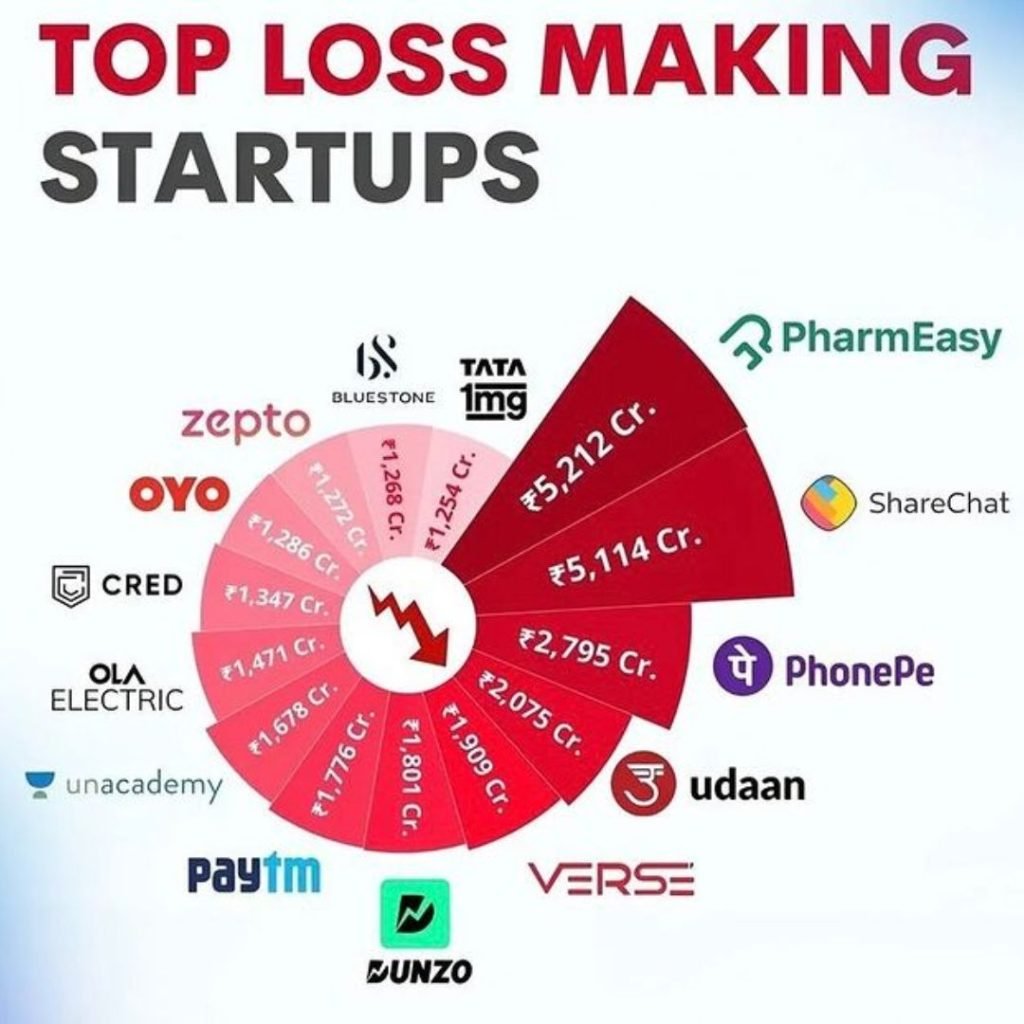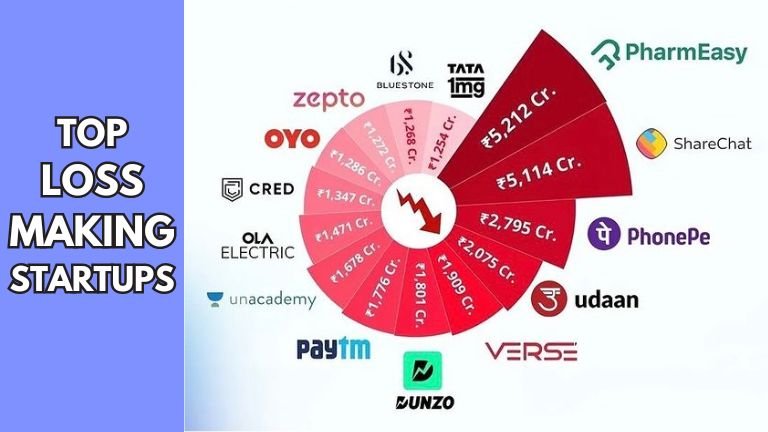Top Loss-Making Startups in India: In the dynamic landscape of India’s startup ecosystem, success stories often capture headlines, showcasing innovation, disruption, and rapid growth. However, behind the scenes, many startups grapple with significant challenges, including financial losses. These losses reflect the complexities and risks inherent in entrepreneurship, highlighting the need for resilience, adaptability, and strategic decision-making. Let’s delve deeper into the top loss-making startups in India and explore the factors contributing to their financial struggles.

- PharmEasy: With losses amounting to a staggering Rs 5,212 Crore, PharmEasy, an online pharmacy platform, faced formidable obstacles despite its promising beginnings. The healthcare sector in India is highly regulated, presenting compliance challenges and logistical hurdles for startups like PharmEasy. Moreover, intense competition and pricing pressures further compounded the company’s financial woes.
- ShareChat: As a social media platform catering to regional languages, ShareChat enjoyed rapid user adoption. However, converting this user base into sustainable revenue proved challenging, resulting in losses of Rs 5,114 Crore. Monetizing user-generated content while maintaining user engagement remains a significant hurdle for platforms like ShareChat, especially amidst competition from global giants.
- PhonePe: Despite its widespread popularity as a digital payment platform, PhonePe reported losses of Rs 2,795 Crore. The fintech space in India is fiercely competitive, with multiple players vying for market share. Additionally, heavy investments in technology infrastructure and customer acquisition contributed to PhonePe’s financial strain.
- Udaan: Udaan, an e-commerce platform targeting small and medium enterprises (SMEs), faced challenges in scaling its operations efficiently. With losses amounting to Rs 2,075 Crore, Udaan struggled to balance growth aspirations with operational costs. Moreover, disruptions in supply chains and logistics during the pandemic exacerbated the company’s financial difficulties.
- VERSE: As a fintech startup, VERSE aimed to disrupt traditional banking systems. However, with losses of Rs 1,909 Crore, the company encountered regulatory hurdles and difficulties in achieving profitability. Building trust and credibility in the financial services sector requires time and investment, factors that contributed to VERSE’s financial losses.
- UNZO: UNZO, a social commerce platform, reported losses of Rs 1,801 Crore, highlighting the challenges of monetizing user engagement effectively. While social commerce holds immense potential in India’s burgeoning e-commerce market, generating sustainable revenue streams remains a key challenge for startups like UNZO.
- Paytm: Despite its status as one of India’s leading payment platforms, Paytm faced losses of Rs 1,776 Crore. Intense competition from rival platforms, coupled with regulatory uncertainties, posed significant challenges for Paytm’s profitability. Additionally, investments in diversification initiatives further strained the company’s financial performance.
- Unacademy: Recognized as an online learning platform, Unacademy witnessed rapid growth in user engagement. However, investments in marketing and content development led to losses of Rs 1,678 Crore. Achieving profitability in the competitive edtech space requires striking a delicate balance between content quality, user acquisition costs, and pricing strategies.
- Ola Electric: Ola Electric, a subsidiary of the ride-hailing giant Ola, ventured into the electric vehicle segment with ambitious plans for growth. However, with losses amounting to Rs 1,471 Crore, the company faced challenges in scaling its operations and infrastructure. Building a robust charging infrastructure and overcoming consumer adoption barriers remain critical for Ola Electric’s long-term success.
- CRED: Despite its innovative approach to credit card bill payments, CRED encountered challenges in achieving profitability. With losses of Rs 1,347 Crore, the company faced pressure to diversify revenue streams and optimize its business model. Balancing customer acquisition costs with retention efforts posed significant challenges for CRED.
- OYO: Once hailed as India’s largest hospitality chain, OYO faced setbacks amidst controversies and struggles with profitability. With losses of Rs 1,286 Crore, the company grappled with issues related to quality control, customer satisfaction, and regulatory compliance. Navigating the complexities of the hospitality industry requires OYO to reassess its business model and operational strategies.
- Zepto: As a food delivery startup, Zepto aimed to capitalize on the growing demand for online food ordering. However, intense competition and operational challenges led to losses of Rs 1,272 Crore. Achieving economies of scale while maintaining service quality remains a daunting task for startups operating in the hyper-competitive food tech industry.
- Bluestone: Despite its prominence in the jewellery e-commerce sector, Bluestone faced challenges in achieving profitability. With losses amounting to Rs 1,268 Crore, the company struggled to differentiate its brand and product offerings in a crowded market. Enhancing customer experience and building brand loyalty are essential for Bluestone’s sustained growth.
- Tata 1mg: Backed by a corporate giant like Tata, 1mg aimed to revolutionize the healthcare e-commerce space. However, with losses of Rs 1,254 Crore, the company encountered challenges in scaling its operations and overcoming regulatory hurdles. Building trust among consumers and healthcare providers is crucial for Tata 1mg’s long-term viability.
In conclusion, the top loss-making startups in India face multifaceted challenges ranging from intense competition and regulatory constraints to operational complexities and market dynamics. While these setbacks underscore the inherent risks associated with entrepreneurship, they also present valuable learning opportunities. As startups navigate these challenges, resilience, adaptability, and strategic foresight are crucial for charting a path towards sustainable growth and success in India’s vibrant startup ecosystem.
